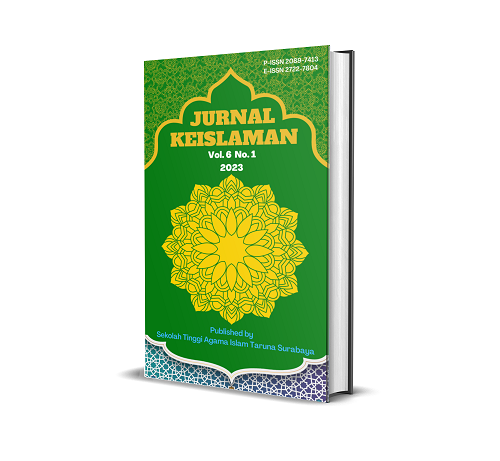Toleransi Beragama Berbasis Kearifan Lokal di Pulau Lombok Nusa Tenggara Barat
Abstract
Tolerance is an effort made by religious people to respect each other and respect each other's beliefs. Lombok community with multicultural religion is very prioritizing the principle of tolerance through local wisdom. The approach used in this study is a qualitative approach with descriptive analysis method. The results of this study reveal that, local-based Tolerance conducted by religious people in Lombok as shown in the religious activities of the community that includes followers of other religions to participate in their religious practices. Such as Christmas, ' Eid, Vesak celebration, and other religious practices. Lombok's muslim community does not hesitate to invite their non-muslim neighbors to enliven the halal bi halal event, the Prophet's birthday and other celebrations, Hindus also invite their neighbors to enliven the ogoh-ogoh event which is their routine religious event, Christians also share and invite their neighbors to enliven their Christmas event. So that tolerance in the local wisdom of the people of Lombok is based on three aspects, namely solidarity, mutual cooperation, and deliberation. These three things are the local culture of the community that has been practiced for generations, in order to achieve a harmonious and orderly life.References
Abdurrazak, Sukron Azhari, Putra Wanda, Lalu Suparman Ambakti, dan Humamurrizqi. “RELIGIOUS TOLERANCE BASED ON LOCAL WISDOM: SOCIAL PERSPECTIVE OF LOMBOK COMMUNITY: Kata Kunci: Toleransi, Umat Beragama, Kearipan Lokal.†Jurnal Lektur Keagamaan 20, no. 1 (6 September 2022): 203–26. https://doi.org/10.31291/jlka.v20i1.1027.
Asnawi, Asnawi. “Respons Kultural Masyarakat Sasak Terhadap Islam.†Ulumuna 9, no. 1 (30 Juni 2005): 1–19. https://doi.org/10.20414/ujis.v9i1.440.
Bakar, Abu. “KONSEP TOLERANSI DAN KEBEBASAN BERAGAMA.†TOLERANSI: Media Ilmiah Komunikasi Umat Beragama 7, no. 2 (10 Februari 2016): 123–31. https://doi.org/10.24014/trs.v7i2.1426.
Basarudin, Basarudin. “Sejarah Perkembangan Islam Di Pulau Lombok Pada Abad Ke-17.†SANGKéP: Jurnal Kajian Sosial Keagamaan 2, no. 1 (18 Juli 2019): 31–44. https://doi.org/10.20414/sangkep.v2i1.933.
Budiwanti, Erni. Islam Sasak ; Wetu Telu versus Waktu Lima. Yogyakarta: LKiS, 2000.
Dan Mochamad Widjanarko, Dp Budi Susetyo. Revitalisasi Toleransi Beragama Berbasis Kearifan Lokal. Semarang: Penerbitan Universitas Katolik Soegijapranata, 2017.
Dan Mukminah, Harlan. Local Wisdom Tradisi Merarik Suku Sasak Islam Waktu Lima. Mataram: Pustaka Bangsa, 2019.
Gazi, Saloom. “Dinamika Hubungan Kaum Muslim Dan Umat Hindu Di Pulau Lombok.†Jurnal Multikultural Dan Multireligius Vol. VIII, no. No. 30, April-Juni (2009).
Kembarawan, I. Gusti Komang. “Construction Of Social Solidarity Between Hindus And Muslims At Ogoh-Ogoh Parade In Tanjung, North Lombok.†Kamaya: Jurnal Ilmu Agama 3, no. 3 (20 September 2020): 273–97.
Lestari, Lestari. “ISLAM TRADISIONAL MASYARAKAT KOPANG.Doc.†Jurnal Penelitian Tarbawi: Pendidikan Islam Dan Isu-Isu Sosial 2, no. 1 (2017): 12–19. https://doi.org/10.37216/tarbawi.v2i1.137.
Nafilah, Abdullah. “Toleransi Beragama Di Lereng Menoreh Kabupaten Magelang.†Jurnal Esensia Vol. XIII, no. No. 2, Juni (2012).
Nur Probowo Setyabudi Dkk, Muhamad. Harmoni Dalam Keragamaan: Jejak Budaya Toleransi Di Manado, Bali, Dan Bekasi. Jakarta: Yayasan Pustaka Obor Indonesia, 2021.
Praswoto, Adi. Metode Penelitian Kualitatif Dalam Perpektif Rancangan Penelitian. Cet. III. Yogyakarta: Ar-Ruz Media, t.t.
Rifai, Mohammad. Perbandingan Beragama. Jakarta: Wicaksana Semarang, 1984.
Rusydi, Ibnu, dan Siti Zolehah. “MAKNA KERUKUNAN ANTAR UMAT BERAGAMA DALAM KONTEKS KEISLAMAN DAN KEINDONESIAN.†Al-Afkar, Journal For Islamic Studies 1, no. 1, January (18 Januari 2018): 170–81. https://doi.org/10.31943/afkar_journal.v1i1.13.
Saepul Muhtadi, Asep. Komunikasi Lintas Agama: Menata Kehidupan Harmoni Di Tengah Masyarakat Multiagama. Bandung: Simbiosa Rekatama Media, 2009.
Saloom, Gazi. “Dinamika Hubungan Kaum Muslim dan Umat Hindu di Pulau Lombok,†Juni 2009.
Sumada, I. Ketut. “TOLERANSI BERAGAMA DALAM RANGKA MEWUJUDKAN KAHARMONISAN DI TENGAH PLURALITAS KEHIDUPAN MASYARAKAT LOMBOK MELALUI KESADARAN BUDAYA.†Widya Sandhi: Jurnal Kajian Agama, Sosial Dan Budaya 10, no. 2 (2019): 2136–48.
Suryana, Toto. “KONSEP DAN AKTUALISASI KERUKUNAN ANTAR UMAT BERAGAMA.†Jurnal Pendidikan Agama Islam 9, no. 2 (2011): 11.
Takdir, Mohammad. “Model-Model Kerukunan Umat Beragama berbasis Local Wisdom.†Tapis : Jurnal Penelitian Ilmiah 1, no. 01 (9 Juli 2017): 61. https://doi.org/10.32332/tapis.v1i01.728.
Tohri Dkk, Ahmad. “Indeks Toleransi Antar Umat Beragama Di Kabupaten Lombok Timur.†Jurnal Ilmu Sosial Dan Humaniora Vol.19, no. No. 3, Desember (2021).
Wach, Joachim. The Comparative Study Of Religions. New York: Columbia University Press, 1958.
Wahid Wafi, Ali Abdul. Kejeniusan Ibnu Khaldun. Jakarta Timur: Nuansa Press, 2004.
Yuliani, Meri, M. Si Drs. I Wayan Mudana, dan M. Hum Drs. I Made Pageh. “Pura Di Antara Seribu Masjid: Studi Kerukunan Antaretnis Bali Dan Sasak Di Desa Karang Tapen, Cakranegara, Lombok Barat.†Widya Winayata: Jurnal Pendidikan Sejarah 6, no. 3 (12 Desember 2018). https://doi.org/10.23887/jjps.v6i3.8710.
Zuhdi, Muhammad Harfin. “Kearifan Lokal Suku Sasak sebagai Model Pengelolaan Konflik di Masyarakat Lombok.†Mabasan 12, no. 1 (2018): 287904. https://doi.org/10.26499/mab.v12i1.34.
Copyright (c) 2023 Subhan Abdullah Acim, Rahman Rahman

This work is licensed under a Creative Commons Attribution-ShareAlike 4.0 International License.
Authors who publish with this journal agree to the following terms:
- Authors retain copyright and grant the journal right of first publication with the work simultaneously licensed under a Creative Commons Attribution-ShareAlike that allows others to share the work with an acknowledgement of the work's authorship and initial publication in this journal.
- Authors are able to enter into separate, additional contractual arrangements for the non-exclusive distribution of the journal's published version of the work (e.g., post it to an institutional repository or publish it in a book), with an acknowledgement of its initial publication in this journal.
- Authors are permitted and encouraged to post their work online (e.g., in institutional repositories or on their website) prior to and during the submission process, as it can lead to productive exchanges, as well as earlier and greater citation of published work (See The Effect of Open Access).






















